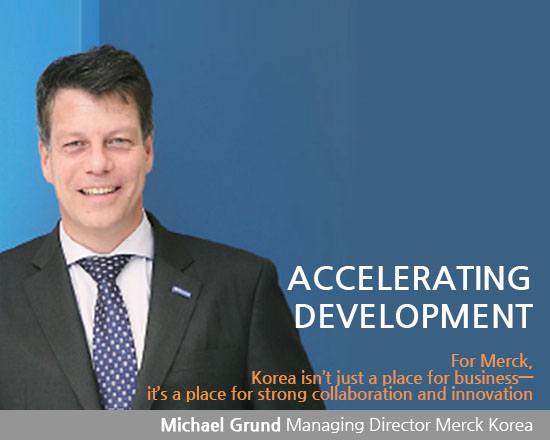
For Merck, Korea isn’t just a place for business—it’s a place for strong collaboration and innovation
Founded in Darmstadt, Germany in 1668 by Friedrich Jacob Merck, Merck is the world’s oldest science and technology company specializing in the fields of healthcare, life science and performance materials. Around 50,000 employees work in 66 different countries to further develop technologies that improve and enhance life. These technologies include cutting-edge systems for scientific research and production and liquid crystals for smartphones and LCD televisions. It’s no surprise then that that the company has set up shop in Korea to expand its life science and performance material sector. Most recently, Merck established the M-Lab Collaboration Center in Songdo, Incheon to provide biopharmaceutical manufacturers with an ideal environment to solve their toughest challenges and accelerate development and production of new therapies.
Dr. Michael Grund, Managing Director of Merck Korea talks to KOTRA Express on what makes Korea a well-cultivated landscape for its technological development.
What made Korea an ideal place for business for a company like Merck?
Korea’s economy is characterized by a small number of companies (conglomerates), which represents the lion’s share of the Korean economy. These conglomerates have a global footprint and occupy top rankings in their respective businesses. Merck came to Korea more than 20 years ago and supported the tremendous growth of the Korean economy by close collaboration with these players from the very beginning. The joint success story of the Korean display industry and Merck, the global market leader in display materials, is just one prominent example. Consequently Merck did not only invest into the supply chain and production of its parts, but also in the R&D and application/training centers to mutually benefit both partners. .
Merck appreciates the continuous support from the Korean government, the country’s stable economic environment and the people’s can-do spirit. Korea shaped the markets with its unique set-up in the past and will do so in the future. In this sense, the country can be regarded as the “lab of the future”.
How can Korea become a more ideal investment and business destination for foreign companies?
We appreciate a stable, predictable business environment, including issues dealing with regulation or taxation because we are thinking of making long-term investments. As a local Merck-subsidiary, we compete with other Merck subsidiaries for resources; continuous support from government is very much appreciated so that our headquarters can continue to stay committed and do business in the country.
Does your company have strong business partnerships with domestic companies here in Korea?
The majority of our business is with global Korean companies. We are only successful because we seamlessly collaborate from the earliest R&D stage based on mutual trust and cooperation. This is our major pillar of our success.
What are some of the goals that your company has for Korea and Northeast Asia and are there any further investment activities that will take place here?
Merck is where our customers are; our business in the Asia Pacific region today already outperforms our business in Europe. We are prepared and willing to invest into future growth engines. In Korea, for example, we are focusing on technologies in electronics and display, biotechnology and other promising future drivers of growth. Our most recent examples of commitment include last year’s opening of our OLED application center, this year’s establishment of M-Lab in Songdo and the memorandum of understanding (MOU) with Incheon Free Economic Zone (IFEZ).
Speaking of M-Lab, why did Merck choose Songdo in particular and what does the company hope to achieve through M-Lab?
Songdo in Incheon is one of the world’s biotech hotspots, as it hosts R&D and is the operation site of global Korean players in this field. Merck does everything to support these companies to be successful; that’s why we moved our M-Lab to Songdo. In our M-Lab our customers can explore our products and services, get training that is classroom based and hands-on, develop their processes by easily optimizing them in our fully equipped, non-GMP environment and speed up their overall time-to-market. Together with the continuous support of Incheon city and IFEZ we can create a more complete bio ecosystem.
What is your advice to foreign companies interested in extending their reach to Asia?
Korea has a proven track record and is ranked at the top in a number of industries. But the global economy is changing and the recipe of the past might not work in the future any more. To master the challenges of the future, global cross-collaboration between companies and organizations is mandatory. This needs to be the common long-term benefit of both partners and relationships must be founded on mutual respect and trust. I strongly recommend building this relationship first to establish a prosperous business.
By Esther Oh (estheroh@kotra.or.kr)
Executive Consultant/Invest Korea










